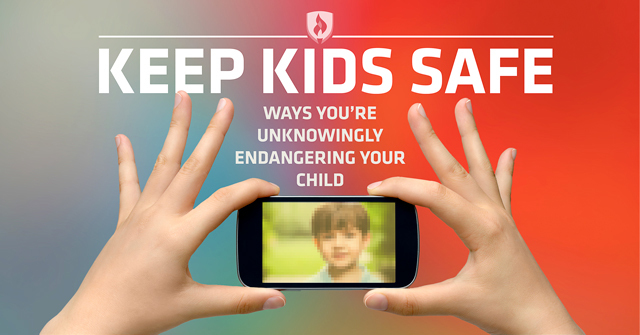
Every parent wants the best for their kids, but it’s not always easy to keep them from falling into harm’s way. Your mind can overflow with “what ifs” when it comes to your children’s safety. What if they run into a stranger walking home from school? What if the microwave catches on fire while they’re home alone? What if they get lost and their cell phone dies?
You can’t avoid every “what if” scenario, but you can take steps to keep kids safe. Take the first step by acknowledging these six ways you’re unknowingly endangering your child. After all, even parents with the best of intentions make these common mistakes when it comes to their children’s safety.
1. Keeping open privacy settings on social media
Your kids are adorable, so of course you want to show them off to friends and family! Grandma may appreciate the cute bathtime photos, but parents would do well to check their privacy settings before they share.
“Research has found that parents on average upload 973 photos of their child to social media before the child turns five — and of these parents, 17 percent haven't ever reviewed their Facebook privacy settings!” says Kim Maslin, founder of theCyber-Savvy Parenting Initiative.
In a worst-case scenario, those photos could end up in the hands of predators, warns Maslin. At best, all those photos floating around can turn into a privacy issue for your kids down the road when they’re entering the workforce. Limit photo sharing to close friends and relatives, and remember that less is more when it comes to social media.
2. Not having an emergency plan
Schools and workplaces drill for fires, lockdowns, tornadoes and other emergencies — but does your family do the same? The same natural disasters that occur at work and school can happen in your own home. Having an emergency plan for your household is key to keeping kids safe.
Prepare your kids for the unexpected by having a plan in place for a variety of emergencies and practicing it with them periodically.
“To prepare kids for safety emergencies, I recommend parents discuss the situation in an open and mature way,” says Maslin. “Inform the child of the risks and what to do should the worst occur.”
3. Relying on cell phones
Many parents buy their children cell phones so the lines of communication are always open. Phones may seem like a no-brainer safety precaution, but they can sometimes do more harm than good.
“Giving your child a cell phone does not automatically make them safer,” says Denise DeRosa, tech parenting expert and founder of Cyber Sensible.
You don’t need to get rid of your child’s phone altogether, but you should teach them basic safety rules for using their device. DeRosa recommends “using the privacy and safety settings available on the phone, limiting the geolocation services, limiting access to their information from the apps they use and talking to them about who and how they connect with others online.”
4. Sharing personal details online
You may have taught your kids not to share their personal information online, but are you sharing too many details yourself? Something as simple as sharing your location on an Instagram photo of your daughter’s soccer game or mentioning your son’s school on Facebook could compromise their safety.
Maslin discourages posting any personal information, including date of birth, addresses and the name of your child’s school or sports teams.
5. Not asking enough questions
One of the simplest ways to keep kids safe is to ask plenty of questions about where they’re going, when they’ll be home and who they’ll be with. Unfortunately, many parents skip out on this simple precaution because they don’t want to seem “uncool” or overprotective.
It’s also important to keep the lines of communication open with other adults who will be supervising your child during playdates or other activities. Kid Safe Foundation recommends asking questions such as, “Who will be watching the children?” or “Will you be staying in your house?” and “What safety rules do you have in your house?”
6. Waiting until kids are older to teach basic safety rules
Parents may not want to bring up safety issues with young children until they’re older. After all, they’re with you or another trusted adult most of the time and you don’t want to scare them. But the truth is, even preschoolers can find themselves in emergency situations and should be taught basic safety rules, such as how to call 911 and what to do if they’re approached by a stranger. They should also know basic personal information, like their parents’ full names and their address.
Present safety information to your kids in a calm, collected way. “Children feed off your emotions — so if you remain calm and matter-of-fact, odds are your child will respond the same. However, if you appear nervous, frantic or scared, that energy will be picked up by your child who may then be fearful unnecessarily,” says Maslin.
Keep kids safe in every situation
You can’t be there for your kids in every scary situation, but you can avoid these common pitfalls and prepare them to react calmly in an emergency. Thanks to these expert tips, you can banish those “what ifs” from your mind and be confident in your kids’ ability to stay safe.
As a parent, you already know more than you think about how to keep kids safe. Learn about the other police officer skills you’ve already perfected as a parent!
RELATED ARTICLE:




